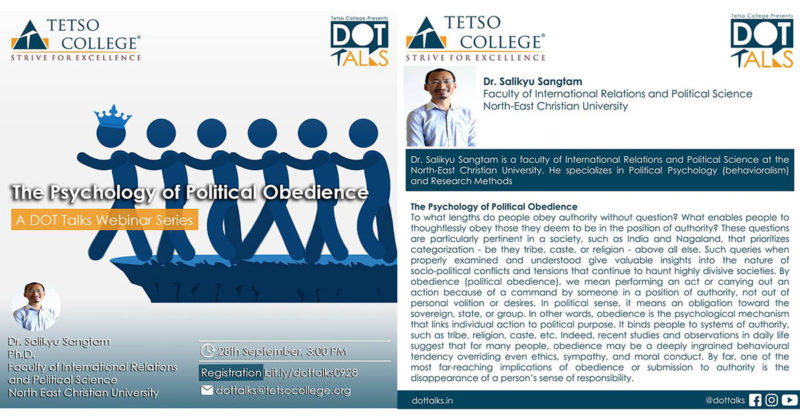To what lengths do people obey authority without question? What enables people to thoughtlessly obey those they deem to be in the position of authority? To address these questions, Dr. Salikyu Sangtam, a faculty of International Relations and Political Science at the North East Christian University, was invited to speak in the DOT Talks webinar titled ‘The Psychology of Obedience’ organized by Tetso College on 28th September, 2020.
Dr. Salikyu who specializes in political psychology (behavioralism) and research methods stated that these questions are particularly pertinent in a society, such as India and Nagaland, that prioritizes categorization—be they be tribe, caste, or religion—and such queries when properly examined and understood give valuable insights into the nature of socio-political conflicts and tensions that continue to haunt highly divisive societies.
Beginning his talk, Dr. Salikyu explained that political obedience means performing an act or carrying out an action because of a command by someone in a position of authority, not out of personal volition or desires. In this context, obedience can be understood as a psychological mechanism that that links individual action to political purpose, he said. It also binds us to a system of authority and one of the far reaching consequences of obedience or submission to authority is the disappearance of a person’s sense of authority, he added. This is visibly evident especially when individual persons are immersed in a crowd and individuals in a mass crowd are especially prone to obedience, a phenomenon that is yet to be properly grasped to appreciate the recurring tumultuous communal political events and other political outcomes, he asserted.
In the context of our society, the crowd has come to play an essential role for tribal and communal leaders and politicians to attain certain aims, as masses become slaves to the will of their masters (i.e. tribal and communal leaders), he maintained. Dr. Salikyu said that this is particularly true as the primordial and instinctual pull of tribal or communal organization still looms large in most of our lives, with many identifying and stereotyping both ourselves and others based on categories, such as tribe, caste, or religion, to which we adhere or belong. For this, he said that the fear of exclusion or being alienated by one’s group, clan, or tribe could be one of the many factors why people are made to adhere to blind obedience.
He maintained that although it is beneficial to have some sense of obedience on the part of the citizens in a society such as obeying law and order to prevent crime. But in some cases, obedience can lead to brutal outcomes which is evident when we look at history such as Hitler’s Germany, Stalin’s Soviet Union, Mao’s China, Khmer Rouge in Cambodia, etc., he added. He also took the example of the 2015 Dimapur mob lynching where about 7000–8000 people broke into a prison, dragged a man detained under suspicion of rape out of the Dimapur Central Jail, paraded him naked and beat him to death in a case of vigilante justice.
The talk ended with a Q&A session where several queries were raised by the participants answered by the resource speaker.

